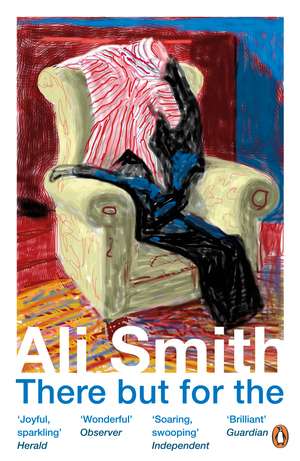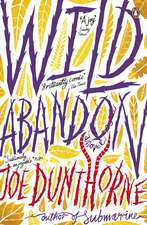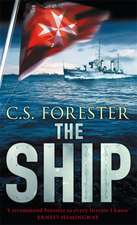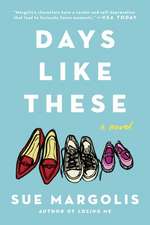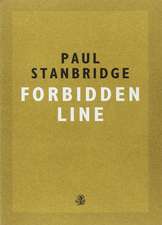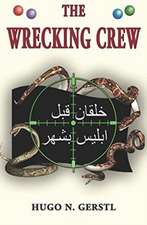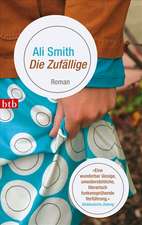There but for the
Autor Ali Smithen Limba Engleză Paperback – 4 iul 2012
A sparkling satire from the MAN BOOKER PRIZE-SHORTLISTED and WOMEN'S PRIZE-WINNING author ofHow to be bothand the critically acclaimedSeasonalquartet
'Playful, humorous, serious, profoundly clever and profoundly affecting'Guardian
'Adventurous, intoxicating, dazzling. This is a novel with serious ambitions that remains huge fun to read'Literary Review
'Smith can make anything happen, which is why she is one of our most exciting writers today'Daily Telegraph
'There once was a man who, one night between the main course and the sweet at a dinner party, went upstairs and locked himself in one of the bedrooms of the house of the people who were giving the dinner party . . .'
As time passes by and the consequences of this stranger's actions ripple outwards, touching the owners, the guests, the neighbours and the whole country, so Ali Smith draws us into a beautiful, strange place where everyone is so much more than they first appear...
| Toate formatele și edițiile | Preț | Express |
|---|---|---|
| Paperback (2) | 64.02 lei 3-5 săpt. | +10.95 lei 6-10 zile |
| Penguin Books – 4 iul 2012 | 64.02 lei 3-5 săpt. | +10.95 lei 6-10 zile |
| Anchor Books – 30 iun 2012 | 115.42 lei 3-5 săpt. |
Preț: 64.02 lei
Nou
Puncte Express: 96
Preț estimativ în valută:
12.25€ • 13.35$ • 10.32£
12.25€ • 13.35$ • 10.32£
Carte disponibilă
Livrare economică 02-16 aprilie
Livrare express 18-22 martie pentru 20.94 lei
Preluare comenzi: 021 569.72.76
Specificații
ISBN-13: 9780141025193
ISBN-10: 0141025190
Pagini: 384
Dimensiuni: 129 x 198 x 23 mm
Greutate: 0.27 kg
Editura: Penguin Books
Colecția Penguin
Locul publicării:London, United Kingdom
ISBN-10: 0141025190
Pagini: 384
Dimensiuni: 129 x 198 x 23 mm
Greutate: 0.27 kg
Editura: Penguin Books
Colecția Penguin
Locul publicării:London, United Kingdom
Notă biografică
Ali
Smithwas
born
in
Inverness
in
1962.
She
is
the
author
ofSpring,
Winter,
Autumn,
Public
library
and
other
stories,
How
to
be
both,
Shire,
Artful,
There
but
for
the,
The
first
person
and
other
stories,
Girl
Meets
Boy,
The
Accidental,
The
whole
story
and
other
stories,
Hotel
World,
Other
storiesand
other
stories,LikeandFree
Love.Hotel
Worldwas
shortlisted
for
the
Booker
Prize
and
the
Orange
Prize.The
Accidentalwas
shortlisted
for
the
Man
Booker
Prize
and
the
Orange
Prize.How
to
be
bothwon
the
Bailey's
Prize,
the
Goldsmiths
Prize
and
the
Costa
Novel
of
the
Year
Award,
and
was
shortlisted
for
the
Man
Booker
Prize.Autumnwas
shortlisted
for
the
Man
Booker
Prize
2017
andWinterwas
shortlisted
for
the
Orwell
Prize
2018.
Ali
Smith
lives
in
Cambridge.
Recenzii
Whimsically
devastating.
Playful,
humorous,
serious,
profoundly
clever
and
profoundly
affecting
Remarkable. A brilliant novel: funny, serious, always surprising, always true
I take my hat off to Ali Smith. Her writing lifts the soul
A playfully serious or seriously playful novel full of wit and pleasure. Wonderful
Eccentric, adventurous, intoxicating, dazzling. This is a novel with serious ambitions that remains huge fun to read. The writing dances along
Poignant, empathetic, funny. A book full of kindness and compassion
Fizzying, affectionate, sparkling. Smith presents her world view in words as fresh as lemons. A joyful read
A tour de force
A virtuoso piece of writing, both funny and gripping . . . Smith is a writer with a rich array of conventional strengths
A must read
Remarkable. A brilliant novel: funny, serious, always surprising, always true
I take my hat off to Ali Smith. Her writing lifts the soul
A playfully serious or seriously playful novel full of wit and pleasure. Wonderful
Eccentric, adventurous, intoxicating, dazzling. This is a novel with serious ambitions that remains huge fun to read. The writing dances along
Poignant, empathetic, funny. A book full of kindness and compassion
Fizzying, affectionate, sparkling. Smith presents her world view in words as fresh as lemons. A joyful read
A tour de force
A virtuoso piece of writing, both funny and gripping . . . Smith is a writer with a rich array of conventional strengths
A must read
Extras
There
was once a man who, one night between the main course and the sweet at a dinner party, went upstairs and locked himself in one of the bedrooms of the house
of the people who were giving the dinner party.
There was once a woman who had met this man thirty years before, had known him slightly for roughly two weeks in the middle of a summer when they were
both seventeen, and hadn’t seen him since, though they’d occasionally, for a few years after, exchanged Christmas cards, that kind of thing.
Right now the woman, whose name was Anna, was standing outside the locked bedroom door behind which the man, whose name was Miles, theoretically was. She had her arm raised and her hand ready to – to what? Tap? Knock discreetly? This beautiful, perfectly done-out, perfectly dulled house would not stand for
noise; every creak was an affront to it, and the woman who owned it, emanating disapproval, was just two feet behind her. But it was her fist she was standing there holding up, like a 1980s cliché of a revolutionary, ready to, well, nothing quiet. Batter. Beat. Pound. Rain blows.
Strange phrase, to rain blows. Somewhere over the rainblow. She didn’t remember much about him, but they’d never have been friends in the first place if he wasn’t the sort to enjoy a bad pun. Was he, unlike Anna right now, the kind of person who’d know what to say to a shut door if he were standing outside one trying to get someone on the other side to open it? The kind who could turn to that child stretched on her front as far up the staircase as her whole small self would go, the toes of her bare feet on the wood of the downstairs hall floor and her chin in her hands on the fifth step lying there watching, and straight off be making the right kind of joke, what do you call two mushrooms on holiday? Fun guys, straight off be holding forth about things like where a phrase like to rain blows came from in the first place?
The woman standing behind Anna sighed. She somehow made a sigh sound cavernous. After it the silence was even louder. Anna cleared her throat.
Miles, she said to the wood of the door. Are you there?
But the bleat of her voice left her somehow less there herself. Ah, now, see – that’s what it took, the good inappropriateness of that child. Half boy, all girl, she’d elbowed herself up off the staircase, run up the stairs and was about to hammer on the door.
Bang bang bang.
Anna felt each thud go through her as if the child were hammering her on the chest.
Come out come out wherever you are, the child yelled.
Nothing happened.
Open sesame, the child yelled.
She had ducked under Anna’s arm to knock. She looked up at her from under her arm.
It makes the rock in the side of the mountain open, the child said. They say it in the story, therefore the rock just like opens.
The child put her mouth to the door and spoke again, this time without shouting.
Knock knock, she said. Who’s there?
Who’s there?
There were several reasons at that particular time in Anna Hardie’s life for her wondering what it meant, herself, to be there.
One was her job, which she had just given up, in what she and her colleagues laughingly called Senior Liaison, at what she and her colleagues only half-laughingly called the Centre for Temporary Permanence (or, interchangeably, the Centre for Permanent Temporariness).
Another was that Anna had woken up a couple of weeks ago in the middle of her forties in the middle of the night, from a dream in which she saw her own heart behind its ribcage. It was having great trouble beating because it was heavily crusted over with a caul made of what looked like the stuff we clean out of the corners of our eyes in the mornings when we wake up. She woke up, sat up and put her hand on her heart. Then she got up, went to the bathroom mirror and looked. There she was.
The phrase reminded her of something Denny at the Evening News, with whom she’d worked on neighbourhood liaison pieces and with whom she’d had a short liaison herself, had told her some time ago, on their second and last lunchtime. He was a sweet man, Denny. He’d stood in front of her in her kitchen, their first time, and presented his penis to her very sweetly, rueful and hopeful both, a little apologetic about his erection and at the same time proud of it; she liked this. She liked him. But two lunchtimes was all it was, and they both knew it. Denny had a wife, her name was Sheila, and their two girls and their boy were at Clemont High. Anna made a pot of tea, put sugar and milk on the tray because she wasn’t sure what he took, carried it upstairs, slid back into the bed. It was a quarter past one. They had just under half an hour left. He’d asked could he smoke. She’d said, okay, since it’s the last lunch. He’d smiled. Then he’d turned over in the bed, lit the cigarette, changed the subject. He’d said did she know he could sum up the last six decades of journalism in six words?
Go on then, she said.
I was there. There I was, he said.
It was a commonplace, he said. By the middle of the twentieth century every important report put it like this: I was there. Nowadays: There I was.
Soon it would be seven words, Anna said. The new century had already added a seventh word. There I was, guys. She and Denny had laughed, drunk their tea, put their clothes back on and gone back to their different jobs. The last time they’d spoken was some months ago, about how to handle the story with the local kids giving urine to the asylum kids in lemonade bottles to drink.
In the middle of the night, some months later, holding her own heart, feeling nothing, Anna had looked at herself in the mirror in the bathroom. There she was. It was the there-she-was guise.
There she was again, then, two evenings ago, sitting in front of her laptop one summer evening with the noise of Wimbledon coming from neighbours’ TVs through the open windows of the houses all around. Wimbledon was on her own TV too. Her own TV’s sound was turned down. It was sunny in London and the Wimbledon grass was still bright green, only a little scuffed. The TV screen flickered away by itself beyond the laptop screen. Pock noises and oohs and ahs, strangely disconnected from their source, accompanied the little noises she was making on her keyboard. It was as if the whole outside world was TV soundtrack. Maybe there was a new psychosis, Tennis Players’ Psychosis (TPP), where you went through life believing that an audience was always watching you, profoundly moved by your every move, reacting round your every reaction, your every momentous moment, with joy /excitement / disappointment / Schadenfreude. Presumably all professional tennis players had something like it, and maybe so to some extent did everybody who still believed in God. But would this mean that people who didn’t have it were somehow less there in the world, or at least differently there, because they felt themselves less observed? We might as well pray to the god of tennis players, she thought. We might as well ask that god as ask any other for world peace, to keep us safe, to bring all the birds that’ve ever died, ever sunk into dust via little mounds of feather and crumbling hollow little bones, back to life, perch them all on that sill right now, the small ones at the front and the large ones at the back, and have them sing a rousing chorus of Bye Bye Blackbird, which was a song her father used to whistle when she was a little girl, and one she hadn’t heard for many years. No one here to love or understand me. Oh what hard-luck stories they all hand me. Was that it? Something about hard-luck stories, anyway. Just as she was about to look the lyrics up on the net new mail came pinging into her inbox with an electronic little trill.
The new mail was quite a long email which Anna nearly mistook for the please-transfer-money-to-this-account-because–I-am-dying-and-need-your-help kind. But she paused her finger above delete when something about it caught her eye. It was addressed to her with the correct first name but the wrong surname initial. Dear Anna K. It was both her and not her, the name. More: something about it made her feel super-eighted, instamaticked. It gave her a feeling something like the word summer used to. Most of all it reminded her of an old spinebent copy of a Penguin classic paperback by Kafka, yes, Franz Kafka, which she had read one summer when she was sixteen or seventeen.
From the Hardcover edition.
was once a man who, one night between the main course and the sweet at a dinner party, went upstairs and locked himself in one of the bedrooms of the house
of the people who were giving the dinner party.
There was once a woman who had met this man thirty years before, had known him slightly for roughly two weeks in the middle of a summer when they were
both seventeen, and hadn’t seen him since, though they’d occasionally, for a few years after, exchanged Christmas cards, that kind of thing.
Right now the woman, whose name was Anna, was standing outside the locked bedroom door behind which the man, whose name was Miles, theoretically was. She had her arm raised and her hand ready to – to what? Tap? Knock discreetly? This beautiful, perfectly done-out, perfectly dulled house would not stand for
noise; every creak was an affront to it, and the woman who owned it, emanating disapproval, was just two feet behind her. But it was her fist she was standing there holding up, like a 1980s cliché of a revolutionary, ready to, well, nothing quiet. Batter. Beat. Pound. Rain blows.
Strange phrase, to rain blows. Somewhere over the rainblow. She didn’t remember much about him, but they’d never have been friends in the first place if he wasn’t the sort to enjoy a bad pun. Was he, unlike Anna right now, the kind of person who’d know what to say to a shut door if he were standing outside one trying to get someone on the other side to open it? The kind who could turn to that child stretched on her front as far up the staircase as her whole small self would go, the toes of her bare feet on the wood of the downstairs hall floor and her chin in her hands on the fifth step lying there watching, and straight off be making the right kind of joke, what do you call two mushrooms on holiday? Fun guys, straight off be holding forth about things like where a phrase like to rain blows came from in the first place?
The woman standing behind Anna sighed. She somehow made a sigh sound cavernous. After it the silence was even louder. Anna cleared her throat.
Miles, she said to the wood of the door. Are you there?
But the bleat of her voice left her somehow less there herself. Ah, now, see – that’s what it took, the good inappropriateness of that child. Half boy, all girl, she’d elbowed herself up off the staircase, run up the stairs and was about to hammer on the door.
Bang bang bang.
Anna felt each thud go through her as if the child were hammering her on the chest.
Come out come out wherever you are, the child yelled.
Nothing happened.
Open sesame, the child yelled.
She had ducked under Anna’s arm to knock. She looked up at her from under her arm.
It makes the rock in the side of the mountain open, the child said. They say it in the story, therefore the rock just like opens.
The child put her mouth to the door and spoke again, this time without shouting.
Knock knock, she said. Who’s there?
Who’s there?
There were several reasons at that particular time in Anna Hardie’s life for her wondering what it meant, herself, to be there.
One was her job, which she had just given up, in what she and her colleagues laughingly called Senior Liaison, at what she and her colleagues only half-laughingly called the Centre for Temporary Permanence (or, interchangeably, the Centre for Permanent Temporariness).
Another was that Anna had woken up a couple of weeks ago in the middle of her forties in the middle of the night, from a dream in which she saw her own heart behind its ribcage. It was having great trouble beating because it was heavily crusted over with a caul made of what looked like the stuff we clean out of the corners of our eyes in the mornings when we wake up. She woke up, sat up and put her hand on her heart. Then she got up, went to the bathroom mirror and looked. There she was.
The phrase reminded her of something Denny at the Evening News, with whom she’d worked on neighbourhood liaison pieces and with whom she’d had a short liaison herself, had told her some time ago, on their second and last lunchtime. He was a sweet man, Denny. He’d stood in front of her in her kitchen, their first time, and presented his penis to her very sweetly, rueful and hopeful both, a little apologetic about his erection and at the same time proud of it; she liked this. She liked him. But two lunchtimes was all it was, and they both knew it. Denny had a wife, her name was Sheila, and their two girls and their boy were at Clemont High. Anna made a pot of tea, put sugar and milk on the tray because she wasn’t sure what he took, carried it upstairs, slid back into the bed. It was a quarter past one. They had just under half an hour left. He’d asked could he smoke. She’d said, okay, since it’s the last lunch. He’d smiled. Then he’d turned over in the bed, lit the cigarette, changed the subject. He’d said did she know he could sum up the last six decades of journalism in six words?
Go on then, she said.
I was there. There I was, he said.
It was a commonplace, he said. By the middle of the twentieth century every important report put it like this: I was there. Nowadays: There I was.
Soon it would be seven words, Anna said. The new century had already added a seventh word. There I was, guys. She and Denny had laughed, drunk their tea, put their clothes back on and gone back to their different jobs. The last time they’d spoken was some months ago, about how to handle the story with the local kids giving urine to the asylum kids in lemonade bottles to drink.
In the middle of the night, some months later, holding her own heart, feeling nothing, Anna had looked at herself in the mirror in the bathroom. There she was. It was the there-she-was guise.
There she was again, then, two evenings ago, sitting in front of her laptop one summer evening with the noise of Wimbledon coming from neighbours’ TVs through the open windows of the houses all around. Wimbledon was on her own TV too. Her own TV’s sound was turned down. It was sunny in London and the Wimbledon grass was still bright green, only a little scuffed. The TV screen flickered away by itself beyond the laptop screen. Pock noises and oohs and ahs, strangely disconnected from their source, accompanied the little noises she was making on her keyboard. It was as if the whole outside world was TV soundtrack. Maybe there was a new psychosis, Tennis Players’ Psychosis (TPP), where you went through life believing that an audience was always watching you, profoundly moved by your every move, reacting round your every reaction, your every momentous moment, with joy /excitement / disappointment / Schadenfreude. Presumably all professional tennis players had something like it, and maybe so to some extent did everybody who still believed in God. But would this mean that people who didn’t have it were somehow less there in the world, or at least differently there, because they felt themselves less observed? We might as well pray to the god of tennis players, she thought. We might as well ask that god as ask any other for world peace, to keep us safe, to bring all the birds that’ve ever died, ever sunk into dust via little mounds of feather and crumbling hollow little bones, back to life, perch them all on that sill right now, the small ones at the front and the large ones at the back, and have them sing a rousing chorus of Bye Bye Blackbird, which was a song her father used to whistle when she was a little girl, and one she hadn’t heard for many years. No one here to love or understand me. Oh what hard-luck stories they all hand me. Was that it? Something about hard-luck stories, anyway. Just as she was about to look the lyrics up on the net new mail came pinging into her inbox with an electronic little trill.
The new mail was quite a long email which Anna nearly mistook for the please-transfer-money-to-this-account-because–I-am-dying-and-need-your-help kind. But she paused her finger above delete when something about it caught her eye. It was addressed to her with the correct first name but the wrong surname initial. Dear Anna K. It was both her and not her, the name. More: something about it made her feel super-eighted, instamaticked. It gave her a feeling something like the word summer used to. Most of all it reminded her of an old spinebent copy of a Penguin classic paperback by Kafka, yes, Franz Kafka, which she had read one summer when she was sixteen or seventeen.
From the Hardcover edition.
Descriere
Descriere de la o altă ediție sau format:
From the award-winning author of "Hotel World" and "The Accidental," a dazzling, funny, and wonderfully exhilarating new novel. At a posh dinner party in a London suburb, one of the guests suddenly locks himself in an upstairs room and refuses to leave.
From the award-winning author of "Hotel World" and "The Accidental," a dazzling, funny, and wonderfully exhilarating new novel. At a posh dinner party in a London suburb, one of the guests suddenly locks himself in an upstairs room and refuses to leave.
